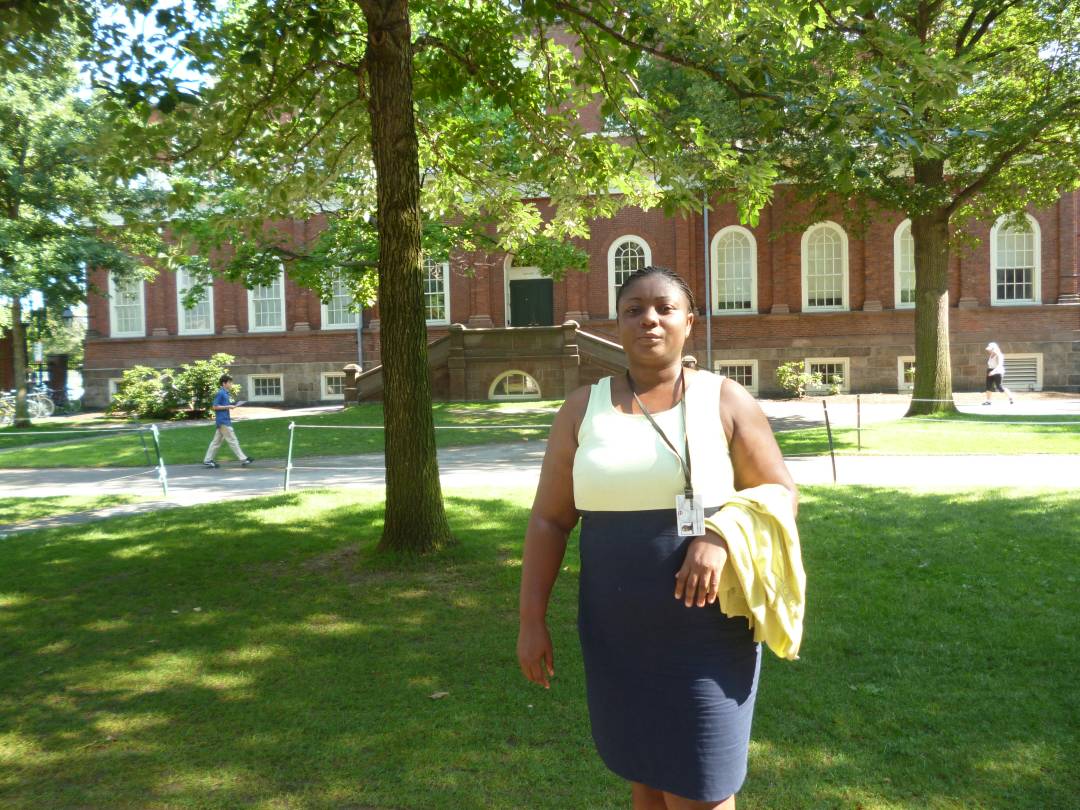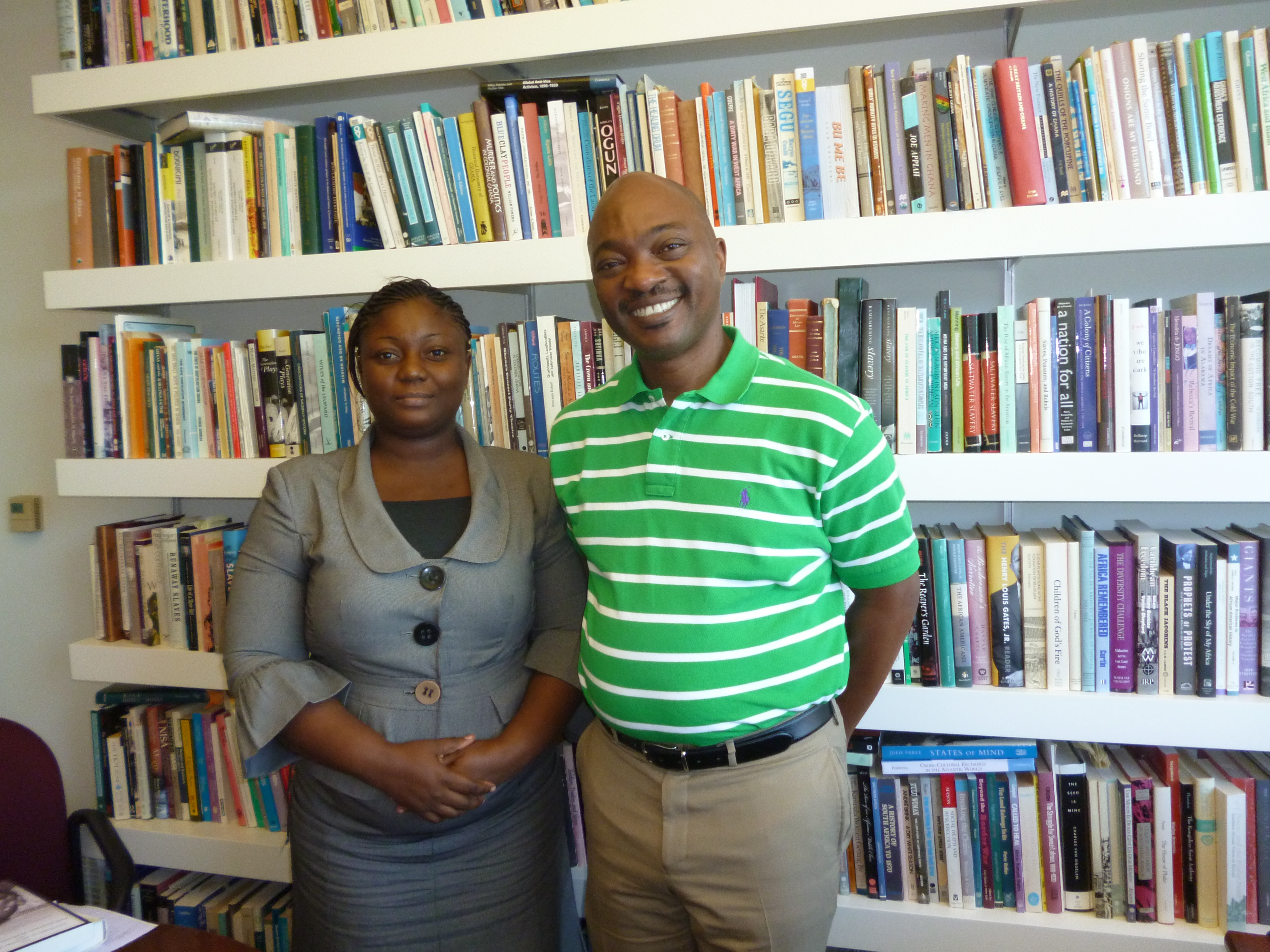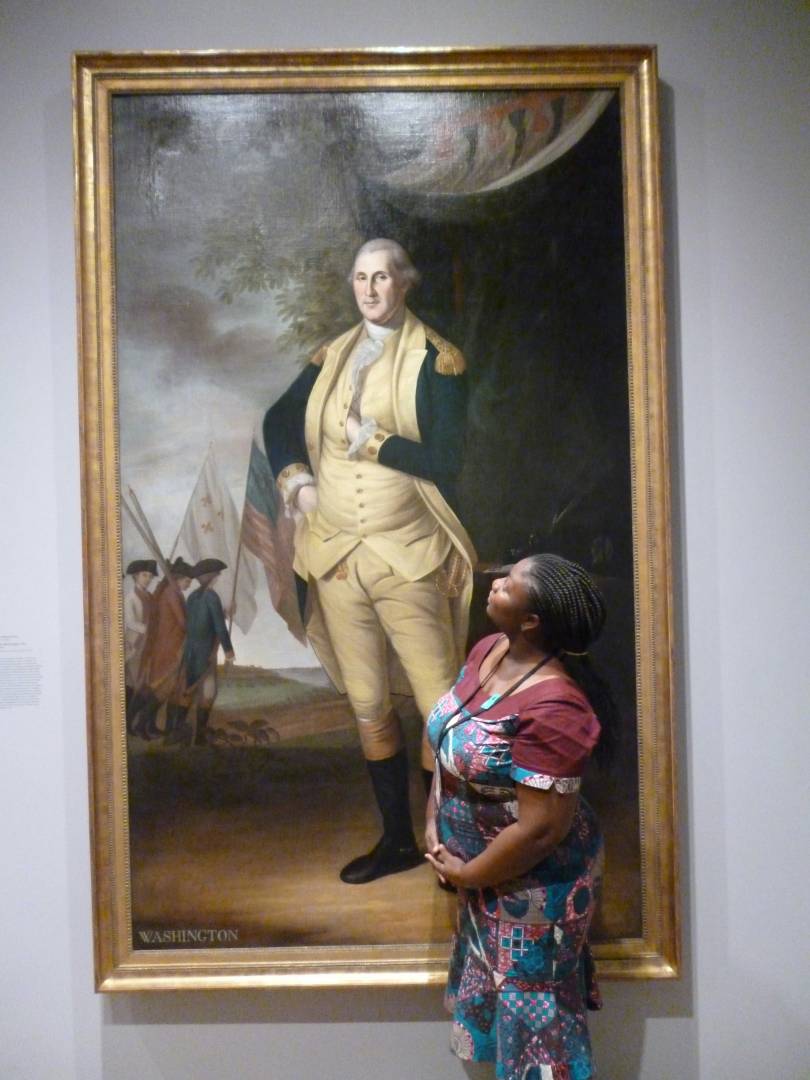


(Ms. Adjoh-Davoh at Harvard University)
My name is Valerie Delali Adjoh-Davoh. I am a Doctoral candidate at the Department of History, University of Cape Coast. The title of my research is “Pawnship in the Gold Coast Colony: Pawn Child Labour in the Period of the Cash Crop Revolution 1874-1940”. The thrust of the research is that market forces after abolition of domestic slavery in 1874 coupled with the introduction of cocoa in the 1890s intensified the use of pawn children in production and export of cocoa until the establishment of Ghana’s Cocoa Marketing Board in 1938. In addition, the work gives understanding to the present use of children in cocoa production in order to curtail it due to the International Labour Organisation’s laws to eliminate the worst forms of child labour in developing countries by 2016.
My fellowship abroad was to conduct research at Harvard University libraries which included: the Houghton library and the Harry Elkins Widener Memorial Library. Also, the fellowship was intended to collaborate with Professor Emmanuel Akyeampong and other scholars interested in forms of unfree labour which included pawnship.
I arrived in Boston on July 2, 2017 where I was warmly received by the fellows and events officer, Rosaline Salifu, of the Harvard Center for African Studies. Since I arrived on a Sunday and July 4, 2017 was a public holiday I had to settle in and formally report to Harvard Center for African Studies on July 5, 2017. I met with my faculty sponsor, Professor Emmanuel Akyeampong, on July 6, 2017. We discussed issues regarding publication of my work when completed, introduction of researchers or scholars in the area of unfree labour, requirements for international publication of both books and articles, and my use of the Harvard University libraries. Also, Professor Akyeampong made useful contributions to my work since he is an expert on forms of unfree labour.

(Ms. Adjoh-Davoh met Prof. Akyeampong on July 6th, 2017)
Through the fellowship I was able to obtain over fifty books and articles from the use of the Harvard University libraries. These included literature on anti-slavery movement, abolition and the end of slavery, pawning among the Fante of the Gold Coast, and child labour. Harvard University also has a franchise which allows its researchers to access dissertations world Wide via ProQuest dissertation in my area of study which hitherto were unavailable to me. These materials will go a long way to enrich my dissertation, later research and teaching generally.
The Harvard University online Archive was useful in gathering pictorial representations of some events in the Gold Coast. These pictures reflected events such as the 1874 Anglo-Asante War, colonialism, Market setting in Cape Coast in the colonial period, female fashion, and Fetishism during wars.

(Ms. Adjoh-Davoh at Harvard Art Museums)
I benefited from my visit to the Harvard Art Museum. At the Harvard Art Museum I had the opportunity of being taken through various artifacts on Africa, the Muslim world, Christianity and other world religions. I was provided with firsthand information on most of the cultures which gives a better understanding to the theoretical aspects of what I knew about other world religions.
Also, I had access to primary materials from the African Studies library within the Mugar Memorial Library, Boston University particularly on Ghana which is useful for my present research as well as later research and study. The primary materials ranged from topics on Ghana’s Cocoa Marketing Board and cocoa in general, Cocoa hold up in the Gold Coast, cocoa co-operatives, child rights in Ghana, agriculture in Ghana, land tenure and Gold Coast annual reports from 1918 to 1954. Besides, these primary materials could be used for many other researches on Ghana.
As a result of the fellowship, I was introduced to a number of scholars in my field of research by Professor Emmanuel Akyeampong. These scholars are Professor Sandra Elaine Greene who is an expert on Ghana, Professor Gareth Austin who has researched extensively on Ghana and forms of unfree labour, and Professor Trevor Getz who has researched extensively on unfree labour after abolition in the Gold Coast. These professors provided useful suggestions to my research which I believe will go a long way to enrich my dissertation and later research.
Further, I was introduced to new primary research sources by my Faculty sponsor such as the Basel Mission Archives online that he compiled in the past to supplement the primary sources which were already available to me on pawnship. The Basel Archives online are especially useful since there are limited sources on pawnship and other forms of unfree labour in the Gold Coast in particular.
In addition, I received a compiled course pack as a gift from my research which to me was his demonstration of his commitment to see others excel and a mark of a good mentor which everyone would want to have in the early stages of their career.
On July 11, 2017 I visited the West African Research Association’s office at Boston University. I met Professor Jennifer Yanco (the immediate past Director of WARA) and Caroline Johnson (the Operations Manager of the West African Research Association). An interview was then conducted on my research and we deliberated generally on child labour. The interview conducted has given me some exposure and recognition regarding my research which I believe will open other opportunities in the future.
Thank you very much to Professor Emmanuel Akyeampong (Oppenheimer Chair of the Harvard Center for African Studies) for inviting me. I greatly appreciate his mentorship and suggestions to see my work progress. Also, I greatly appreciate the support of the staff of the Harvard Center for African Studies in their professionalism in handling my Harvard Id issues and having a fruitful research visit.
Finally, I am very grateful to the West African Research Association for the fellowship to conduct research at Harvard and Boston University libraries as well as collaborate with experts in my field of research. I believe the fellowship is a stepping stone to greater heights in my career as a lecturer and researcher. Therefore I am eternally grateful for the opportunity.